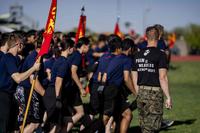This month marks three decades since Argentina’s invasion of the Falkland Islands, and by all accounts, the Argentines still want them back.
Protesters burned a Union Jack and an effigy of Prince William outside the British Embassy in Buenos Aires Monday.
The United Kingdom, as we’ve seen, is still committed to defending them. It’s deploying its newest Type 45 destroyer, the HMS Daring, to the South Atlantic in an unsubtle reminder of that fact.
What will come of all this posturing? Nothing.
Although the prospect of a second Falklands War is a perennial topic in the defense world, the odds seem impossibly remote. As the AP’s Brian Hendrie reports, there is almost no appetite for war among Argentines, and it’s hard to imagine a British public deeply disenchanted with Iraq and Afghanistan would go along with an actual shooting war to defend the Falklands again.
More practically, neither country’s armed forces seem up to the task. Both sides today field such smaller fleets of ships and aircraft that it’s hard to imagine commanders risking them in a stand-up fight. The Royal Navy escaped by the skin of its teeth in the Falklands – “six better fuses and we’d have lost,” as the quip held – and neither it nor the Argentines could absorb the same losses today.
The conflict is worth remembering, however, because it teaches some unpleasant but important lessons about technological war:
• The fight you plan for may not be the fight you get: The Royal Navy of the early 1980s was shaped with an eye to protecting transatlantic convoys in World War III against the Soviets, not expeditionary amphibious campaigns. Among other things, this meant its air defenses were not ideal – commanders had to pair frigates and destroyers in miniature pickets to compensate for the gaps in the other ships’ sensors. That also meant Argentine pilots could fly in low and score hits on the British fleet in San Carlos Water, although, luckily for the British, several of their bombs did not explode.
We've heard so many DoD and service officials cite this principle in their calls for "balance" in the coming build-down, given that there's no way to know exactly what kind of conflict may come next.
• You’ve got to fight with what you have: The Royal Navy got rid of its last traditional aircraft carrier in 1978, leaving it only with the “Harrier carriers” HMS Hermes and HMS Invincible when the Falklands erupted. The Hermes was very old and the Invincible was originally designed for anti-submarine warfare – and neither could field the vital airborne early warning aircraft the navy once had. So commanders had to make do with repurposed ships flying a handful of repurposed aircraft to defend the task group with very limited domain awareness. It worked, but only just.
• Your losses are going to be worse than you think: The British lost six major ships, including two destroyers and two frigates; ten were badly damaged. The Royal Navy and British Army’s losses could have been much worse if more Argentine weapons had detonated and Argentine pilots attacked more of the British troop carriers, as opposed to their warship escorts.
The war cost more than 100 Argentine aircraft, according to John Roberts’ history of the Royal Navy, “Safeguarding the Nation,” as well as its cruiser General Belgrano, a submarine and other vessels. And a single loss can have disproportionate consequences, as with the sinking of the cargo ship Atlantic Conveyor, which carried the helicopters British troops were counting on to carry them across the Falklands. Without them, they had to walk.
• The units or capabilities you think will change the game may not: The Argentine fleet, including its carrier, stayed mostly in port after the sinking of the General Belgrano, removing a threat from the British task force and a potentially potent Argentine weapon. The Royal Air Force, which attempted a long-distance attack with Vulcan bombers on Argentine positions on the Falklands, had little effect on the war.
• Troops on the ground are what win the war: The Royal Navy standing offshore could not have fought and beaten the Argentine troops that occupied the Falklands. It had to deliver the forces that actually ejected the invaders.
• Your battle fleet is not the full measure of your combat power: The Royal Navy’s task force depended on support from merchant ships taken up from trade, as well as its own auxiliaries. The ability to marshal this kind of logistics support is as important as fielding warships.
What other lessons should we draw 30 years after the Falklands?









